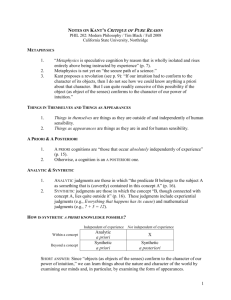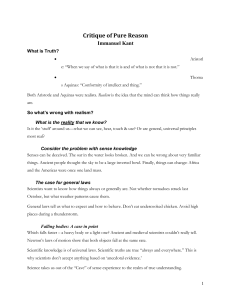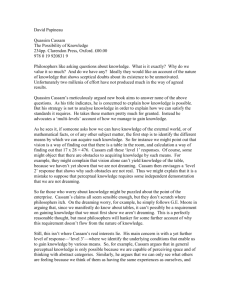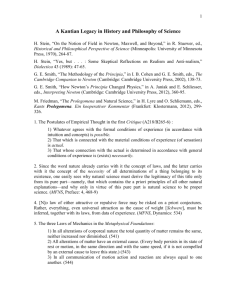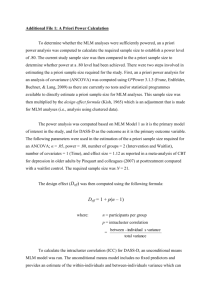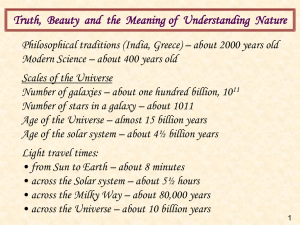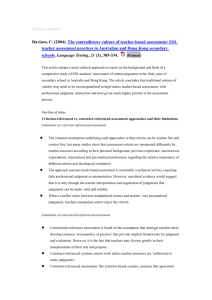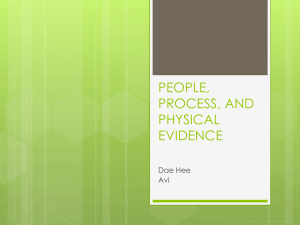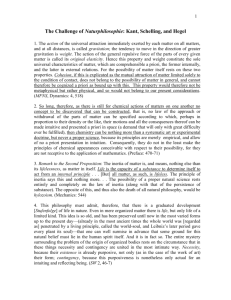CHID495, Spr-2010 reading guide Reading Guide: CPR
advertisement
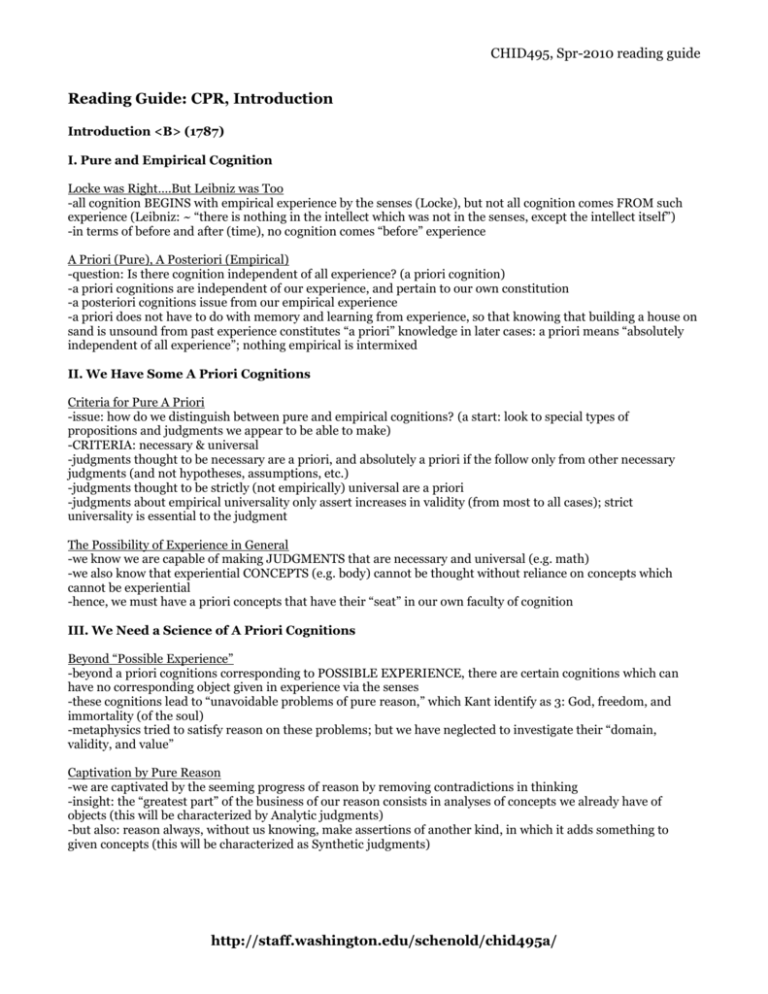
CHID495, Spr-2010 reading guide Reading Guide: CPR, Introduction Introduction <B> (1787) I. Pure and Empirical Cognition Locke was Right….But Leibniz was Too -all cognition BEGINS with empirical experience by the senses (Locke), but not all cognition comes FROM such experience (Leibniz: ~ “there is nothing in the intellect which was not in the senses, except the intellect itself”) -in terms of before and after (time), no cognition comes “before” experience A Priori (Pure), A Posteriori (Empirical) -question: Is there cognition independent of all experience? (a priori cognition) -a priori cognitions are independent of our experience, and pertain to our own constitution -a posteriori cognitions issue from our empirical experience -a priori does not have to do with memory and learning from experience, so that knowing that building a house on sand is unsound from past experience constitutes “a priori” knowledge in later cases: a priori means “absolutely independent of all experience”; nothing empirical is intermixed II. We Have Some A Priori Cognitions Criteria for Pure A Priori -issue: how do we distinguish between pure and empirical cognitions? (a start: look to special types of propositions and judgments we appear to be able to make) -CRITERIA: necessary & universal -judgments thought to be necessary are a priori, and absolutely a priori if the follow only from other necessary judgments (and not hypotheses, assumptions, etc.) -judgments thought to be strictly (not empirically) universal are a priori -judgments about empirical universality only assert increases in validity (from most to all cases); strict universality is essential to the judgment The Possibility of Experience in General -we know we are capable of making JUDGMENTS that are necessary and universal (e.g. math) -we also know that experiential CONCEPTS (e.g. body) cannot be thought without reliance on concepts which cannot be experiential -hence, we must have a priori concepts that have their “seat” in our own faculty of cognition III. We Need a Science of A Priori Cognitions Beyond “Possible Experience” -beyond a priori cognitions corresponding to POSSIBLE EXPERIENCE, there are certain cognitions which can have no corresponding object given in experience via the senses -these cognitions lead to “unavoidable problems of pure reason,” which Kant identify as 3: God, freedom, and immortality (of the soul) -metaphysics tried to satisfy reason on these problems; but we have neglected to investigate their “domain, validity, and value” Captivation by Pure Reason -we are captivated by the seeming progress of reason by removing contradictions in thinking -insight: the “greatest part” of the business of our reason consists in analyses of concepts we already have of objects (this will be characterized by Analytic judgments) -but also: reason always, without us knowing, make assertions of another kind, in which it adds something to given concepts (this will be characterized as Synthetic judgments) http://staff.washington.edu/schenold/chid495a/ CHID495, Spr-2010 reading guide IV. Difference Between Analytic and Synthetic Judgments Analytic and Synthetic [note: “judgment” just means predication about identified object: e.g. “this pencil is sharpened”] -analytic judgments like “all bodies are extended in space” identify the predicate (extension in space) in the subject (the concept of a body); we just analyze the concept of body to see that it contains the concept of extension in its definition -synthetic judgments like “all bodies have weight” do not identify the predicate (weightiness) in the subject (the concept of a body); our experience is added in this kind of judgment Judgments of Experience are all Synthetic -p.142: “I can first cognize … synthetic combination of intuitions” -but there are also “synthetic a priori judgments” – the most difficult to handle – in which experience is of no aid -synthetic a priori judgments like “everything that happens has its cause[s],” which contains a concept of cause that does not pertain to an identified concept of the object (grounded in a concept), nor something experienceable in general (grounded in the empirical experience about which the predication is made) V. Synthetic A Priori Judgments Are Principles of Theoretical Sciences of Reason Judgments, Propositions in Math, Natural Science -Kant basically uses confusing examples to exemplify his point about synthetic a priori judgments; he simply wants to state that common judgments in those two fields rely on synthetic a priori judgments VI. The Problem of Pure Reason The Main Inquiry of the CPR: HOW ARE A PRIORI SYNTHETIC JUDGMENTS POSSIBLE? -Sub-questions: --How is Pure Math possible? --How is Pure Natural Science possible? --How is Metaphysics as a Predisposition of Reason possible? ----How is metaphysics possible as a science? -Math and N.S. prove the possibility of knowledge in their actuality – that is, they show that they work -Metaphysics, however, is eminently doubtable; yet metaphysics is a NATURAL PREDISPOSITION (Reason, as a faculty of the power of Desire, tends toward metaphysical speculation) The Critique is Needed to Save Human Reason From Itself -Critique has to do with Reason itself, its “capacity” in regards to objects that come before it (and not objects OF Reason (ideas), which are imagined to be infinity) -direct, dogmatic analysis of a priori cognition of reason can only show what is contained in our concepts, but it cannot hope to show HOW we attain them or use the validly -Critique is for developing the “productive and fruitful growth of a science that is indispensible for human reason” VII. Critique of Pure Reason as a Special Science Transcendental Philosophy -Reason is the faculty that provides the principles of a priori cognition -hence, PURE reason is that which contains the principles for cognizing something a priori -transcendental philosophy is NOT a doctrine, it is a transcendental critique -transcendental pertains not to objects, but to “our mode of cognition of objects insofar as is possible a priori -the object of CPR is ultimately the Understanding (see p.150, “…our object…appraisal”) The Architectonic -transcendental philosophy proceeds architectonically, from principles and builds a complete system -CPR is the foundation, not the science itself http://staff.washington.edu/schenold/chid495a/
